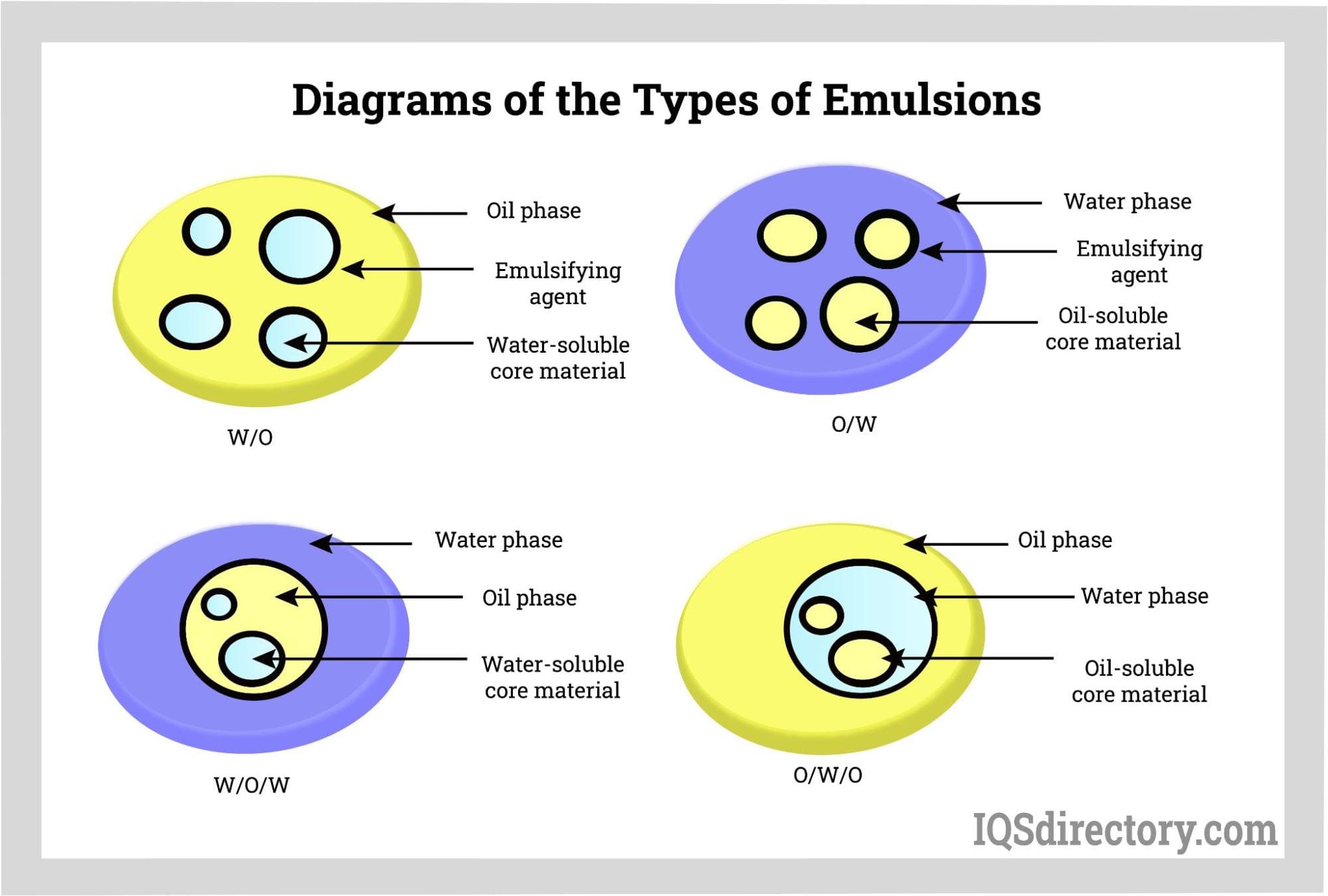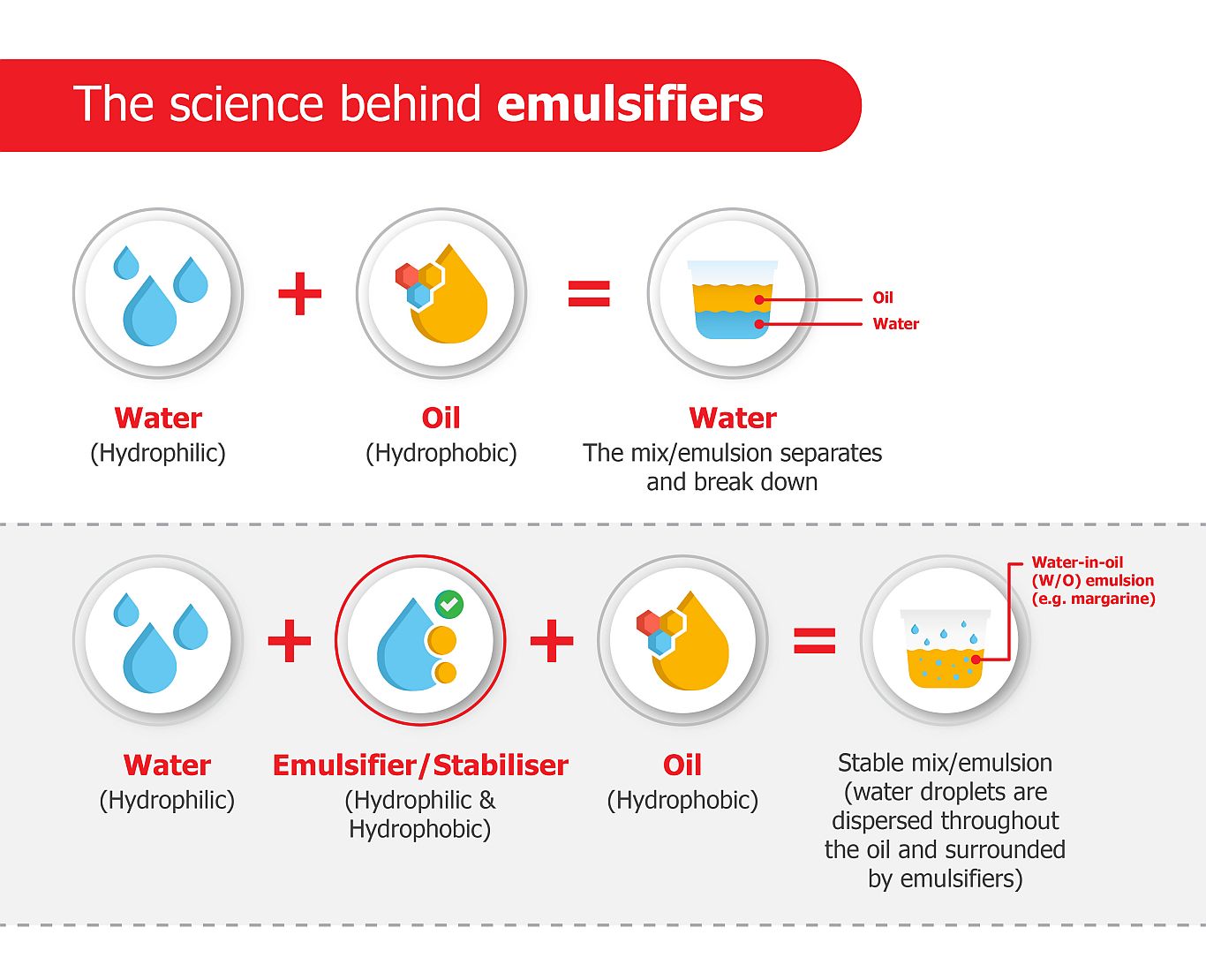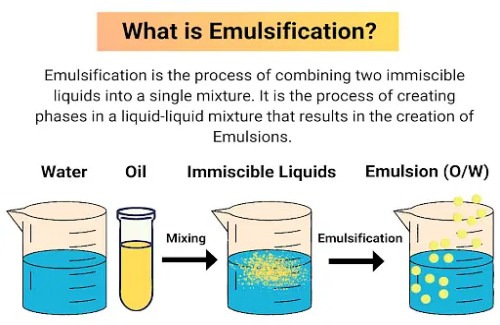Emulsifiers in Infant Formula: What Parents Should Know
Emulsifiers in Infant Formula: What Parents Should Know
Blog Article
The Scientific research Behind Emulsifiers and Their Importance in Modern Production
Emulsifiers play an important role in contemporary production, acting as the unhonored heroes that blend oil and water for a wide range of items. As consumer choices shift towards cleaner labels, the demand for innovative emulsifiers is expanding.
What Are Emulsifiers?
Emulsifiers are necessary representatives in the globe of food and item manufacturing, acting as the glue that binds two otherwise immiscible liquids, like oil and water. Typical instances consist of lecithin discovered in egg yolks and soybeans, and mono- and diglycerides used in various refined foods.

When you whip up a salad clothing or delight in a velvety treat, emulsifiers aid maintain that ideal structure. Without emulsifiers, lots of foods would certainly divide, leading to unwanted appearances and tastes.
The Chemistry of Emulsification
When you blend oil and water, you could see they don't blend easily; that's where the chemistry of emulsification comes into play. Emulsification occurs when little beads of one liquid disperse in another, creating a secure combination. This takes place due to the fact that oil and water are immiscible because of their differing polarities-- water is polar while oil is non-polar. To overcome this challenge, emulsifiers are employed.
These particles have a hydrophilic (water-attracting) head and a hydrophobic (water-repelling) tail. When you add an emulsifier, its particles position themselves at the oil-water interface, reducing surface area tension and allowing the beads to blend. The emulsifier creates a protective layer around each droplet, stopping them from integrating back right into different layers. Comprehending this chemistry is important for achieving security in products like dressings, lotions, and sauces, making emulsification essential in modern-day manufacturing.
Sorts Of Emulsifiers
Various types of emulsifiers play necessary roles in supporting mixtures of oil and water. Natural emulsifiers, like lecithin from egg yolks or soy, are acquired from plants and animals, making them preferred in food items.
On the other hand, synthetic emulsifiers, such as mono- and diglycerides, are chemically crafted to enhance stability and life span. They're commonly utilized in refined foods and cosmetic products.
In addition, you might encounter non-ionic, anionic, and cationic emulsifiers, each with one-of-a-kind buildings that affect their performance. Non-ionic emulsifiers, as an example, job well in a large range of pH degrees, while anionic emulsifiers often tend to do better in alkaline conditions. Comprehending these kinds can aid you pick the right emulsifier for your certain application.
Devices of Solution Development
Recognizing just how solutions develop is necessary for creating steady blends of oil and water. When you introduce an emulsifier, it decreases the surface stress in between the two liquids, allowing them to blend even more quickly.
The emulsifier particles have a hydrophilic (water-attracting) head and a hydrophobic (oil-attracting) tail. When you include an emulsifier, these molecules prepare themselves at the oil-water user interface. The hydrophilic heads communicate with water, while the hydrophobic tails secure right into the oil. This develops an obstacle that stabilizes the beads, preventing them from coalescing.
Applications of Emulsifiers in Numerous Industries
Emulsifiers play an essential duty throughout various sectors, making your preferred foods smoother and more delightful. In cosmetics, they boost item texture and security, guaranteeing a pleasant application experience. Plus, in drugs, they assist provide essential active ingredients efficiently, boosting overall effectiveness.
Food Industry Makes Use Of
While you could not understand it, emulsifiers play an essential role in the food industry, enhancing the structure, stability, and shelf life of lots of products. In baked products, emulsifiers enhance dough handling and keep moisture, resulting in a far better structure and expanded freshness. By ensuring uniformity and quality, emulsifiers are significant to providing the scrumptious products you delight in every day, making them an essential active ingredient in modern food production.
Aesthetic Formulas Benefits
When it comes to aesthetic formulations, emulsifiers are essential for creating items that really feel glamorous and perform successfully. You'll notice that emulsifiers improve item stability, stopping splitting up and lengthening shelf life. On the whole, emulsifiers play a crucial duty in delivering top notch cosmetic items that satisfy your appeal needs.
Pharmaceutical Applications Introduction
In the pharmaceutical industry, Website emulsifiers are necessary for formulating efficient drugs. They aid create steady blends of oil and water, ensuring that energetic ingredients are uniformly dispersed and conveniently soaked up by the body. You'll find emulsifiers in various dosage forms, like lotions, lotions, and fluid suspensions, boosting the bioavailability of drugs. They also improve the texture and security of items, making them extra enticing and easier to use.
The Impact of Emulsifiers on Product Quality

By making sure secure solutions, you lower the danger of wasting and expand rack life, inevitably conserving you time and cash. You'll also find that emulsifiers can boost the bioavailability of energetic components in your items, making them extra reliable for customers.
In addition, they allow you to develop ingenious formulas that satisfy diverse consumer needs. Whether you're crafting a luscious clothing or an elegant lotion, emulsifiers are vital for accomplishing the preferred results. In brief, by recognizing and leveraging the influence of emulsifiers, you can substantially boost the high quality of your products.
Future Trends in Emulsifier Development
As the need for cleaner tags and lasting products rises, the growth of brand-new emulsifiers is set to evolve considerably. You'll see a change towards plant-based and natural emulsifiers, driven by customer preferences for ingredients that are ecologically friendly and less refined. Technologies in biotechnology will likely improve the functionality and performance of these emulsifiers, enabling suppliers to develop stable solutions with less additives.
You could likewise see a boost in multifunctional emulsifiers that not only support emulsions yet also improve taste, structure, or dietary value. This fad might streamline component checklists while enhancing product performance.
Additionally, with advancements in nanotechnology, emulsifiers can be engineered at the molecular degree to achieve unmatched stability and effectiveness. Emulsifiers. As you check out these fads, you'll discover that the future of emulsifier growth is not just concerning functionality, yet likewise concerning embracing sustainability and openness in ingredients
Often Asked Inquiries
Are Emulsifiers Safe for Consumption in Food Products?
Yes, emulsifiers are generally safe for intake in foodstuff. They've been thoroughly researched and approved by food safety and security authorities, More hints so you can enjoy your preferred foods without bothering with their effect on your wellness.
Can Emulsifiers Be Derived From Natural Sources?
Yes, you can obtain emulsifiers from all-natural resources. Ingredients like lecithin from egg yolks or soybeans and casein from milk are typical. These all-natural emulsifiers aid stabilize combinations without synthetic additives, making them prominent in numerous items.

Just How Do Emulsifiers Influence Shelf Life of Products?
Emulsifiers maintain mixes, protecting against separation and perishing - Emulsifiers. try this web-site By maintaining uniformity, they expand products' service life, ensuring freshness and top quality. You'll notice that emulsifiers assist keep your preferred foods and cosmetics performing well over time
What Are Possible Adverse Effects of Emulsifiers?
You may experience digestive issues when consuming items with emulsifiers, as they can interfere with digestive tract microorganisms. Some studies suggest prospective web links to swelling or allergic reactions, but much more research study is required to fully understand these impacts.

Are There Alternatives to Standard Emulsifiers?
Yes, there are alternatives to typical emulsifiers. You can explore alternatives like natural periodontals, starches, or lecithin. Each alternate offers special homes, so experiment to locate what works best for your certain application.
Report this page